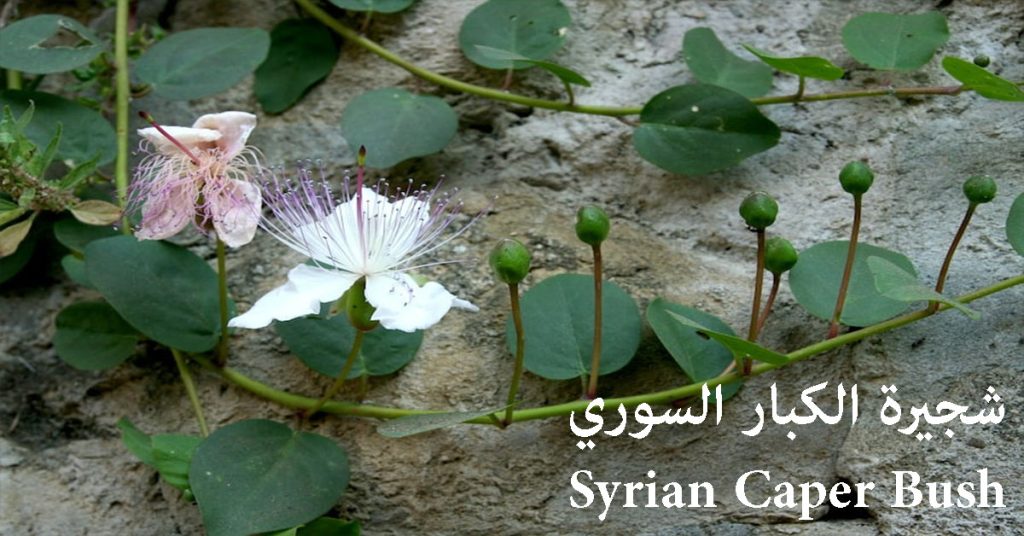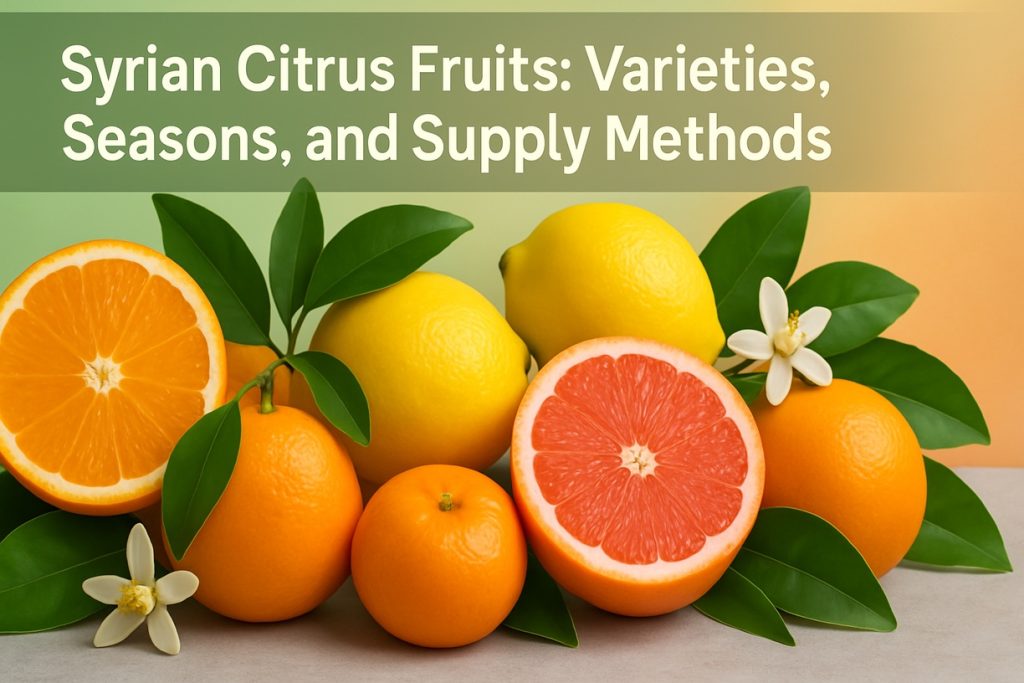Syria, a land rich in agricultural heritage, possesses a hidden gem with immense potential for global markets: the Caper Bush (Capparis spinosa). This resilient plant, native to the Mediterranean basin, thrives in arid and semi-arid conditions, making it particularly well-suited to the Syrian climate. While capers are a staple in Mediterranean cuisine worldwide, the Syrian variety, often wild-harvested, offers a unique profile and an untapped opportunity for both local producers and international importers.
This article aims to provide a comprehensive overview of the Syrian Caper Bush, delving into its agricultural characteristics, nutritional and culinary value, the challenges faced by Syrian producers, and the emerging opportunities in the global market. It seeks to bridge the cultural and commercial gaps between Syrian agricultural stakeholders and international markets, subtly highlighting the role of platforms like AlTojjar in facilitating this vital connection.
By understanding the unique attributes of Syrian capers and addressing the existing barriers, we can unlock the full potential of this valuable agricultural product, fostering economic growth in Syria and enriching global culinary experiences.
Agricultural Characteristics and Growing Conditions
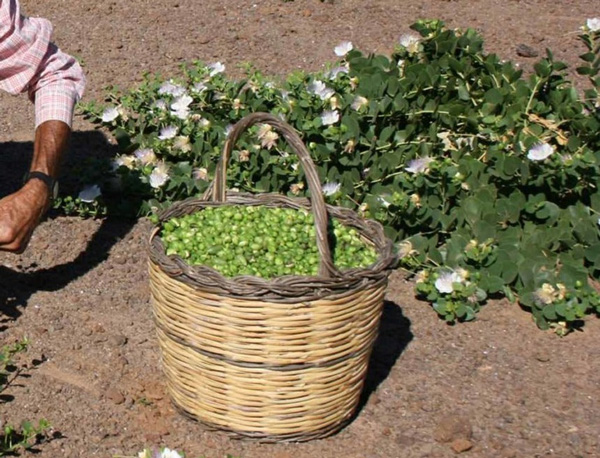
Capparis spinosa, commonly known as the Caper Bush, is a perennial plant remarkably adapted to harsh, arid, and semi-arid environments. Its resilience makes it particularly well-suited to the climatic conditions prevalent in Syria and other Mediterranean regions. Key characteristics include:
- Drought Tolerance: The Caper Bush is highly drought-tolerant, thriving in conditions with limited precipitation. This is a significant advantage in water-scarce regions, allowing it to grow where many other crops would fail.
- Soil Adaptability: It flourishes in well-drained, often poor, rocky, or sandy soils. This adaptability means it can utilize marginal lands not suitable for conventional agriculture.
- Heat and Sun Loving: Caper bushes require hot, sunny locations to thrive, making them ideal for the warm Syrian climate.
- Wild Abundance in Syria: In Syria, Capparis spinosa is found growing wild extensively, particularly in dry and rocky areas, including the desert regions of the Badia. This natural prevalence underscores its suitability to the local ecosystem.
- Perennial Nature: As a perennial, the Caper Bush offers long-term productivity once established, reducing the need for annual replanting.
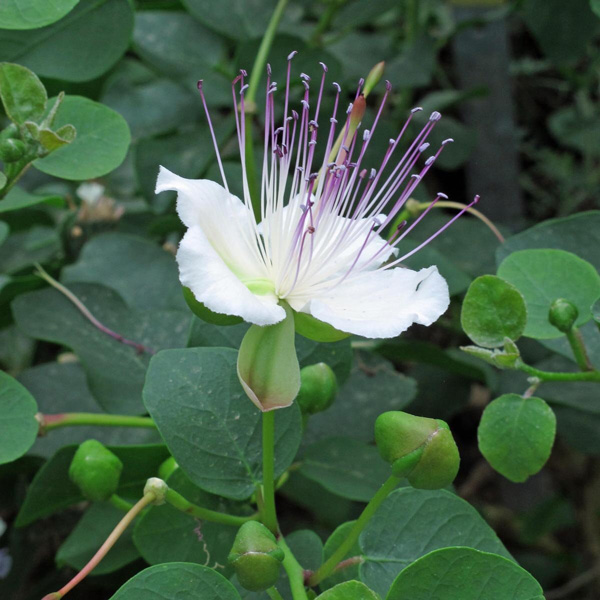
Cultivation Practices
While capers grow wild in Syria, cultivation practices can enhance yield and quality for commercial purposes. Initial research suggests:
- Site Preparation: Practices such as moldboard plowing and harrowing may be employed prior to cultivation to prepare the soil.
- Irrigation: Although drought-tolerant, irrigation is particularly important during the first year of growth to help establish the young plants.
- Adaptability for Economic Development: The plant's resistance to drought, salinity, and water scarcity positions it as a quick-yielding and adaptable crop with high potential for agricultural development, especially in southern regions.
Nutritional, Culinary, and Medicinal Properties
Capparis spinosa is valued not only for its culinary applications but also for its significant nutritional and medicinal properties, making Syrian capers a distinctive product in the global market.
Nutritional Profile

Capers are low in calories, carbohydrates, protein, and fat. They are a good source of:
- Vitamins: Particularly rich in Vitamin K, and contain smaller amounts of Vitamins A, C, B1, B3, B6, and B9.
- Minerals: Contains essential minerals like copper and iron.
- Fiber: A good source of dietary fiber.
- Other Compounds: Caper seeds are high in fatty acids (Omega-6 and Omega-3), vitamin E, sterols, and carotenoids.
Culinary Uses

Capers are a staple in Mediterranean cuisine, and their use in Syria is deeply rooted in local culinary traditions:
- Flavoring Agent: The pickled flower buds (capers) are widely used to flavor sauces, salads, and various dishes, offering a pungent, salty, and slightly lemony taste.
- Versatile Ingredient: Young fruits (caper berries) and tender branch tips can also be used in salads or cooked dishes.
- Traditional Syrian Uses: Immature de-bittered leaves are eaten alone or in vegetable salads. Mature and semi-mature fruits are similarly used in salads and as cooked ingredients. Traditional Syrian medicine also uses vinegar preparations of dried caper leaves for topical applications.
Medicinal Properties
Caper Bush has been traditionally recognized for its medicinal value, and modern research continues to explore its pharmacological properties:
- Antioxidant Activity: Capers contain various beneficial compounds such as rutin, quercetin, kaempferol, spermidine, stigmasterol, and campesterol, which contribute to their antioxidant activity.
- Blood Sugar Control: Some chemicals in capers might help in controlling blood sugar levels.
- Anti-diabetic Properties: Studies, including those on Capparis spinosa growing in Aleppo, Syria, have investigated its antidiabetic activities.
- Traditional Medicine: Historically, various parts of the caper plant (flower buds, fruits, seeds, shoots, and root bark) have been used in traditional medicine for their therapeutic potential.
These unique properties enhance the value proposition of Syrian capers, appealing to health-conscious consumers and gourmet markets worldwide.
Challenges for Syrian Caper Producers in Accessing International Markets
Syrian caper producers, despite the natural abundance and quality of their product, face significant hurdles in accessing and competing in international markets. These challenges are multifaceted, stemming from both internal and external factors:
Internal Constraints
- Lack of Modern Processing and Packaging: A primary constraint identified in earlier studies (e.g., a 2005 study on Syrian caper market chains) is the lack of training and investment in improved processing and packaging techniques. This can hinder compliance with international quality standards and presentation requirements.
- Limited Market Chain Organization: The caper market chain in Syria has historically been fragmented, with a need for better organization and coordination among producers, processors, and exporters. This affects efficiency, quality control, and the ability to meet large-scale international demand.
- Perception as a Luxury Product: While capers are perceived as a luxury product within Syria, this perception might not translate effectively to international markets without strategic branding and marketing efforts.
- Agricultural Crisis: The broader Syrian agricultural sector has been in crisis, with indicators pointing to a downward trajectory. This general decline impacts all agricultural products, including capers, affecting production capacity and overall export potential.
External Factors
- Economic Sanctions: Economic sanctions imposed on Syria have had a devastating impact on the country's export capacity and international trade. These sanctions create significant barriers to financial transactions, shipping, and overall market access for Syrian products, including capers.
- Import Barriers and Lower Consumption: The Syrian economy has faced challenges from foreign goods flooding the market at low prices, and general import barriers, which can indirectly affect the competitiveness of local products seeking export markets.
- Logistics and Transportation: The conflict and sanctions have severely disrupted logistics and transportation infrastructure, making it difficult and costly to move goods within and out of Syria. This directly impacts the ability of caper producers to reliably deliver products to international buyers.
- Compliance and Certification: Meeting international food safety, quality certifications, and processing standards can be challenging due to limited resources, infrastructure, and access to relevant expertise.
Opportunities for Improvement
Despite these challenges, there are opportunities to improve market access for Syrian capers:
- Export Support: Strengthening export support mechanisms is crucial for improving the competitiveness of Syrian agricultural products.
- Climate-Resilient Agriculture: Promoting climate-resilient agricultural practices can help mitigate some of the environmental challenges faced by producers.
- Diaspora Engagement: Leveraging the Syrian diaspora's existing capacities and networks can be critical in revitalizing trade and establishing new market connections.
- Strategic Partnerships: Collaborating with platforms like AlTojjar can provide digital trade facilitation, logistics solutions, and trade finance options to bridge critical gaps and empower Syrian companies in international trade.
Emerging Market Opportunities and Trends in the Global Caper Industry
The global caper market is experiencing dynamic shifts, presenting new opportunities for producers capable of meeting evolving consumer demands and market trends. While traditional uses remain strong, several emerging trends are shaping the future of the caper industry:
Growing Demand for Specialty and Gourmet Products
- Expanding Food Tastes: As global food tastes expand and consumers seek unique and specialized ingredients, the demand for capers as a versatile condiment is growing. This trend is particularly evident in Mediterranean-influenced cuisines and gourmet food segments.
- Premiumization: Smaller caper buds are generally considered higher quality and command higher prices, indicating a market for premium caper products. Producers focusing on meticulous harvesting and grading can capitalize on this trend.
Health and Wellness Trends
- Organic and Vegan Preferences: There is a significant and increasing demand for organic and vegan food products globally. Capers, being a plant-based ingredient, naturally fit into vegan diets, and organic certification can open doors to health-conscious consumer segments and fetch premium prices.
- Nutritional Benefits: The recognized nutritional value of capers, particularly their vitamin and antioxidant content (flavonoids, alkaloids), aligns with the growing consumer interest in functional foods that offer health benefits.
Sustainability and Ethical Sourcing
- Sustainable Practices: Consumers and importers are increasingly prioritizing sustainably sourced products. Caper cultivation, especially wild-harvested or low-input farming, can align with these values, offering a competitive advantage.
- Fair Trade and Community Impact: Highlighting the positive impact of caper production on local communities and livelihoods, particularly in rural areas, can resonate with ethically-minded buyers.
Market Diversification
- Beyond Traditional Uses: While pickled caper buds are the most common form, there is potential for market diversification into other caper products, such as caper berries, caper leaves, and even caper-derived ingredients for nutraceuticals or cosmetics, leveraging their unique phytochemical properties.
- New Geographic Markets: While Europe and North America are established markets, exploring emerging markets in Asia and the GCC region, where Mediterranean cuisine is gaining popularity, could offer new growth avenues.
Digital Trade and E-commerce
- Online Platforms: The rise of digital trade platforms and e-commerce presents opportunities for producers to directly connect with international buyers, bypassing traditional intermediaries and potentially reaching a wider audience. This is particularly relevant for smaller producers seeking to enter export markets.
To leverage these opportunities, Syrian caper producers can focus on:
- Quality Assurance: Implementing rigorous quality control and obtaining international certifications.
- Product Innovation: Exploring new product forms and value-added caper products.
- Branding and Marketing: Developing a strong brand narrative that highlights the unique origin, quality, and traditional practices of Syrian capers.
- Digital Engagement: Utilizing platforms like AlTojjar to showcase products, connect with buyers, and streamline export processes.
Syrian Caper Production Compared to Other Major Caper-Producing Regions
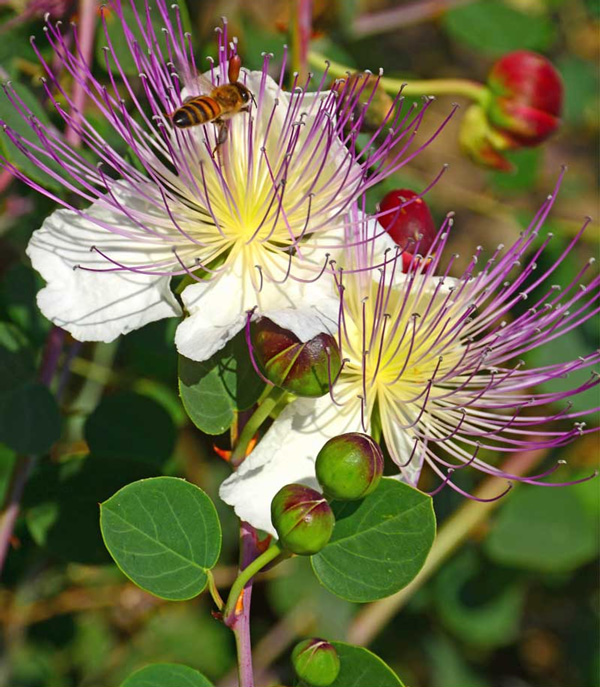
The Caper Bush (Capparis spinosa) is indigenous to the Mediterranean basin, and its cultivation and wild harvesting are prevalent across many countries in the region. While Syria shares many similarities in growing conditions with other Mediterranean caper producers, there are distinct characteristics and historical contexts that differentiate its production.
Similarities with Mediterranean Production
- Climatic Suitability: Like other Mediterranean countries (e.g., Italy, Spain, Greece, Morocco, Tunisia), Syria provides the hot, dry climate and well-drained, often rocky soils ideal for caper growth. The plant's xerophilous nature allows it to thrive in these arid and semi-arid conditions.
- Traditional Harvesting: Across the Mediterranean, caper buds are typically hand-picked, a labor-intensive process that ensures quality and preserves the delicate nature of the buds. Syrian harvesting practices largely align with this tradition.
- Culinary Significance: Capers are deeply embedded in Mediterranean gastronomy, used as pickles, in salads, sauces, and as condiments. Syrian culinary uses of capers are consistent with this regional tradition.
Distinctions of Syrian Caper Production
- Wild Abundance vs. Cultivation: While capers are widely cultivated in some Mediterranean countries (e.g., Italy, Spain), in Syria, the plant is found growing wild extensively across the country, particularly in dry and rocky areas. Historically, the collection of caper flower buds was primarily a wild harvest activity by rural communities, with organized cultivation being a more recent development.
- Untapped Potential: Compared to major caper exporters like Morocco, which supplies a significant portion of global demand, Syrian caper production has historically been limited in its commercialization despite its widespread natural presence. This suggests a large untapped potential for increased production and export.
- Market Chain Development: Studies from the mid-2000s highlighted the nascent stage of the caper market chain in Syria compared to more established and organized market chains in other producing countries. Efforts to reorganize and professionalize this chain are ongoing.
- Impact of Conflict: The recent conflict in Syria has significantly impacted agricultural production, including capers, affecting infrastructure, market access, and overall output. This contrasts with the more stable production environments in many other Mediterranean countries.
- Genetic Diversity: Research has explored the genetic diversity of Capparis species growing in Syria, indicating unique local varieties that could offer distinctive organoleptic properties, potentially differentiating Syrian capers in the global market.
Opportunities for Syrian Capers
Despite the challenges, the wild abundance and traditional knowledge associated with caper harvesting in Syria present a unique competitive advantage. By focusing on:
- Sustainable Wild Harvesting: Promoting sustainable practices for wild caper collection can offer a unique selling proposition.
- Quality Enhancement: Investing in modern processing, packaging, and quality control to meet international standards, similar to those adopted by leading Mediterranean producers.
- Added Value: Exploring new product forms beyond traditional pickled buds, leveraging the plant's various edible parts and medicinal properties.
- Market Linkages: Connecting Syrian producers with international buyers through digital platforms and trade facilitation services to overcome existing trade barriers.
International Quality Certifications, Processing Standards, and Packaging Requirements
To successfully access international markets, Syrian caper producers must adhere to stringent quality certifications, processing standards, and packaging requirements. These standards ensure food safety, product quality, and compliance with importing country regulations.
Key Certifications and Standards
International buyers, particularly in Europe and North America, typically expect products to comply with globally recognized food safety and quality management systems. For capers, key certifications include:
- BRCGS (Brand Reputation Compliance Global Standard): A leading global food safety standard, often a prerequisite for supplying to major retailers.
- IFS (International Featured Standards): Similar to BRCGS, IFS Food is a recognized standard for auditing food manufacturers.
- FSSC 22000 (Food Safety System Certification): A comprehensive certification scheme for food safety management systems, combining ISO 22000 with sector-specific PRPs (Prerequisite Programs).
- HACCP (Hazard Analysis and Critical Control Points): A systematic preventive approach to food safety from biological, chemical, and physical hazards in production processes.
- ISO 9001 (Quality Management Systems): While not food-specific, this certification demonstrates a commitment to quality management across the production process.
- Organic Certifications: With the rising demand for organic and sustainable products, organic certifications (e.g., USDA Organic, EU Organic) are becoming increasingly important for market access and premium pricing.
Processing Standards
Processing of capers for export typically involves:
- Harvesting: Hand-picking of immature flower buds is crucial to maintain quality. The size of the caper bud often dictates its grade and market value.
- Curing/Preservation: Capers are traditionally cured in salt, brine, or vinegar. The curing process is critical for developing their characteristic flavor and ensuring shelf stability. Strict hygiene and quality control must be maintained during this stage to prevent microbial contamination.
- Sorting and Grading: Capers are sorted by size, color, and quality. Uniformity in grading is essential for meeting buyer expectations.
- Washing and Rinsing: Proper washing and rinsing are necessary to remove excess salt or impurities before packaging.
Packaging Requirements
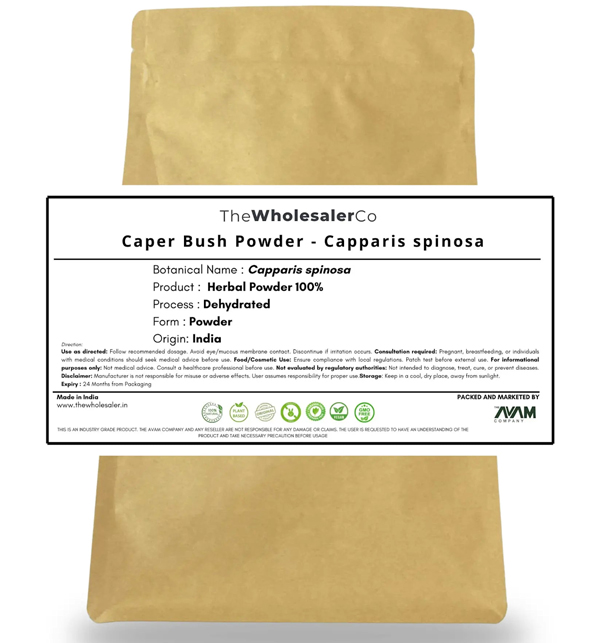
Packaging plays a vital role in preserving product quality, ensuring food safety, and attracting consumers. International packaging requirements often include:
- Food-Grade Materials: Packaging materials must be safe for food contact and comply with international regulations (e.g., FDA, EU regulations).
- Airtight and Secure Sealing: To prevent spoilage, maintain freshness, and avoid leakage, especially for brine-packed capers.
- Appropriate Sizing: Packaging should be available in various sizes to cater to different market segments (e.g., retail, foodservice, bulk).
- Labeling: Labels must comply with the importing country's regulations, including:
- Product Name: Clearly stating "Capers" and potentially the botanical name (Capparis spinosa).
- Net Weight/Volume: Accurate declaration of content.
- Ingredients List: Including capers, salt, water, vinegar, etc.
- Nutritional Information: Standardized nutritional facts panel.
- Country of Origin: Clearly stating "Product of Syria."
- Producer/Exporter Information: Name and address of the responsible party.
- Batch Number and Date: For traceability and recall purposes.
- Storage Instructions: Recommendations for optimal preservation.
- Certification: Displaying relevant organic, food safety, or quality certifications.
- Sustainability: Increasingly, buyers are looking for sustainable and environmentally friendly packaging solutions (e.g., recyclable materials, reduced plastic).
Meeting these requirements necessitates investment in modern processing facilities, adherence to international best practices, and robust quality control systems throughout the supply chain. This is an area where platforms like AlTojjar can provide valuable guidance and resources to Syrian producers.
Conclusion: Unlocking the Potential of Syrian Capers with AlTojjar
The Syrian Caper Bush, a resilient plant deeply rooted in the country's agricultural landscape, represents a significant untapped resource with immense potential for global markets. Despite facing considerable challenges, particularly related to market access and infrastructure, the unique agricultural characteristics, rich nutritional profile, and diverse culinary and medicinal applications of Syrian capers make them a compelling product for international importers.
The global market trends indicate a growing demand for specialty, gourmet, organic, and sustainably sourced products, all of which align perfectly with the inherent qualities of Syrian capers. By focusing on quality assurance, product innovation, and strategic branding, Syrian producers can overcome existing barriers and carve out a distinctive niche in this evolving market.
This is where platforms like AlTojjar become instrumental. AlTojjar serves as a vital digital bridge, connecting Syrian agricultural stakeholders with international markets. It addresses critical gaps in trade infrastructure by offering:
- Digital Trade Facilitation: Streamlining business matching, providing verified business profiles, and managing digital documentation to simplify export procedures.
- Logistics Solutions: Coordinating shipping, warehousing, and real-time tracking to ensure reliable delivery of products.
- Trade Finance Solutions: Explaining and facilitating access to financial mechanisms like letters of credit and trade insurance, crucial for navigating complex international transactions.
- Educational Resources: Offering valuable information on export/import regulations, quality standards, and strategies to mitigate risks, empowering Syrian businesses with the knowledge needed to succeed globally.
By leveraging AlTojjar's comprehensive suite of services, Syrian caper producers can enhance their competitiveness, build trust with international buyers, and effectively showcase the quality and unique heritage of their products. For international importers, AlTojjar provides a trusted and efficient gateway to access high-quality Syrian capers, fostering mutually beneficial trade relationships.
Ultimately, the journey of Syrian capers from the arid landscapes of Syria to kitchens and markets worldwide is not just about trade; it's about building bridges, fostering economic resilience, and sharing a unique agricultural treasure with the world. Through collaborative efforts and strategic partnerships, the hidden potential of Syrian capers can be fully realized, contributing to both local prosperity and global culinary diversity.

